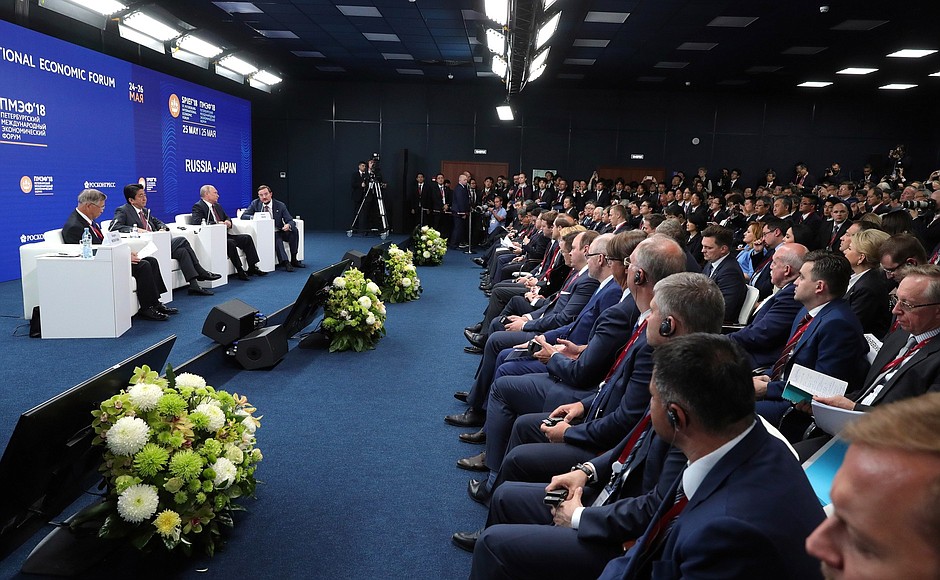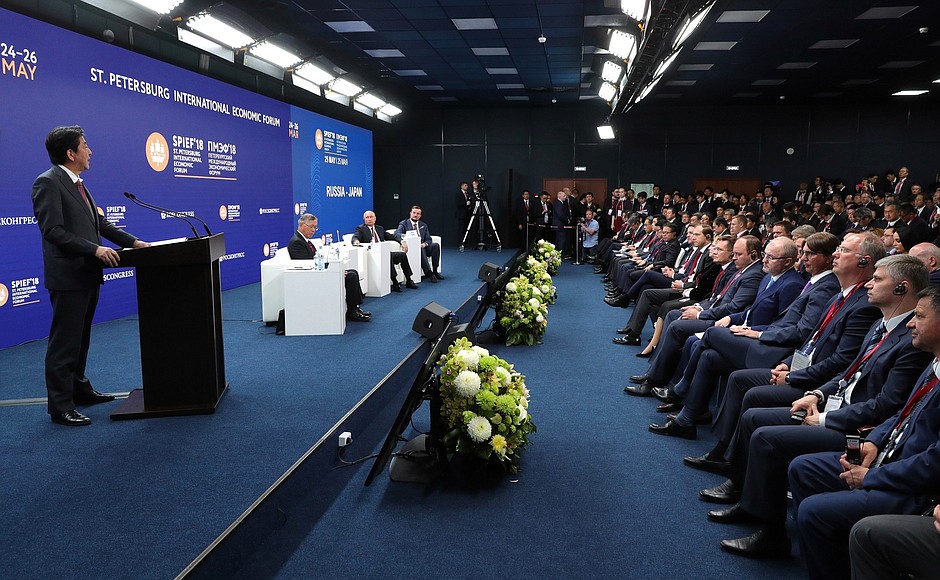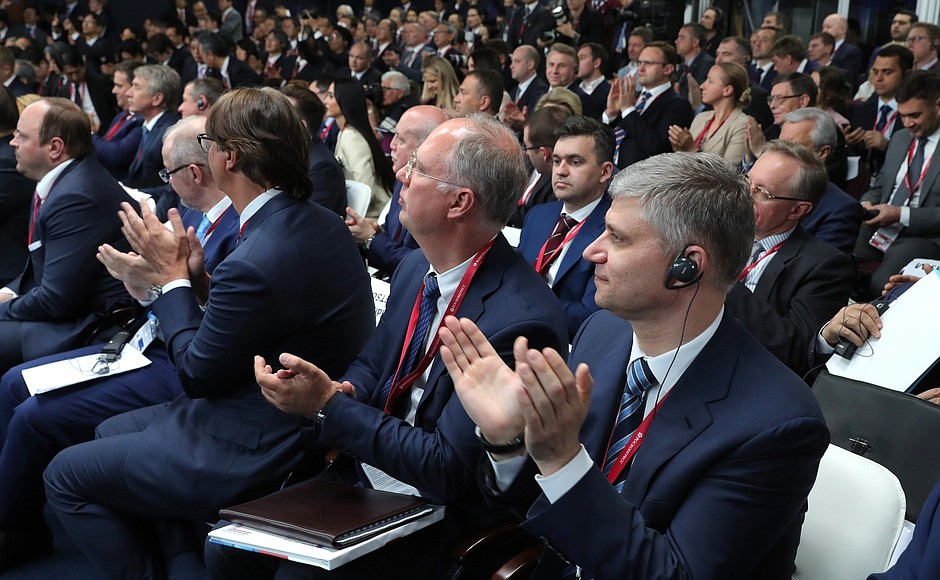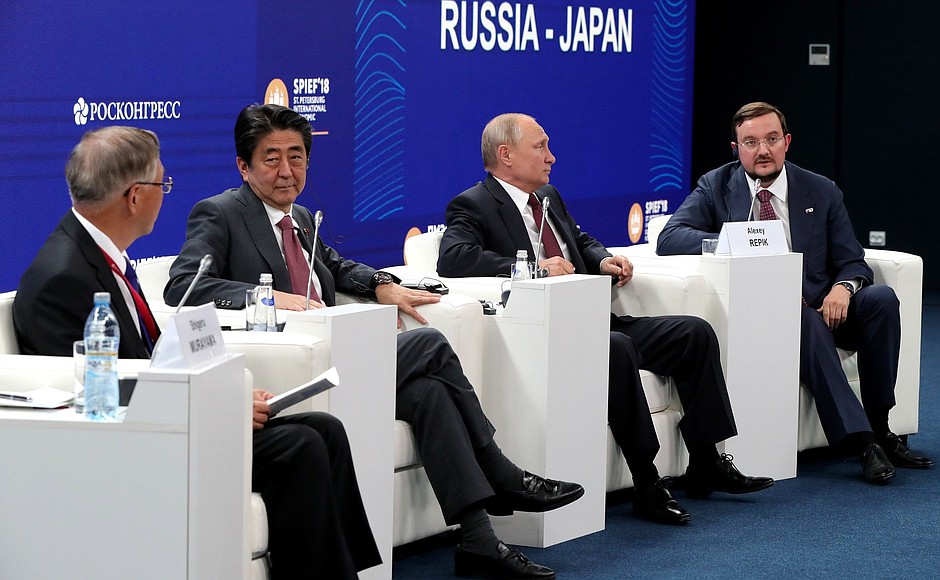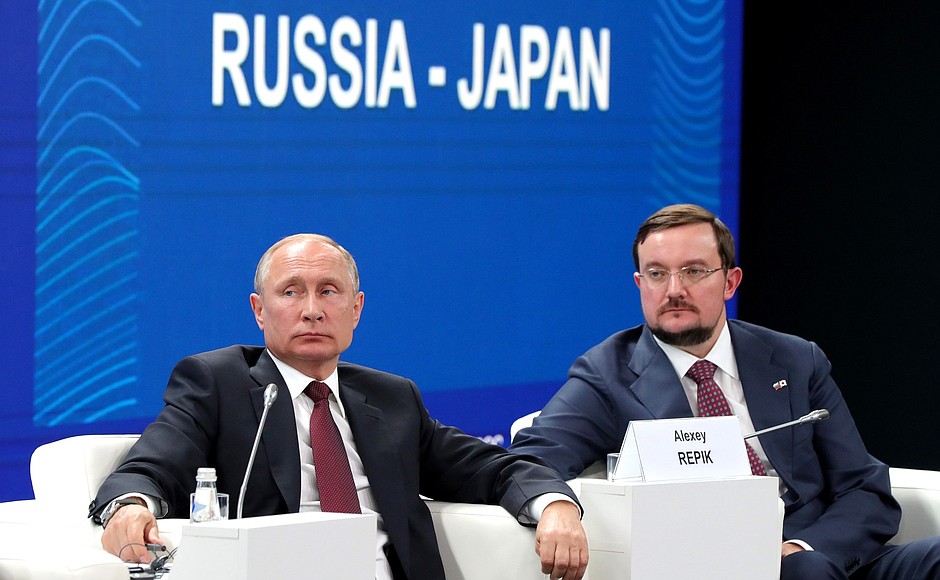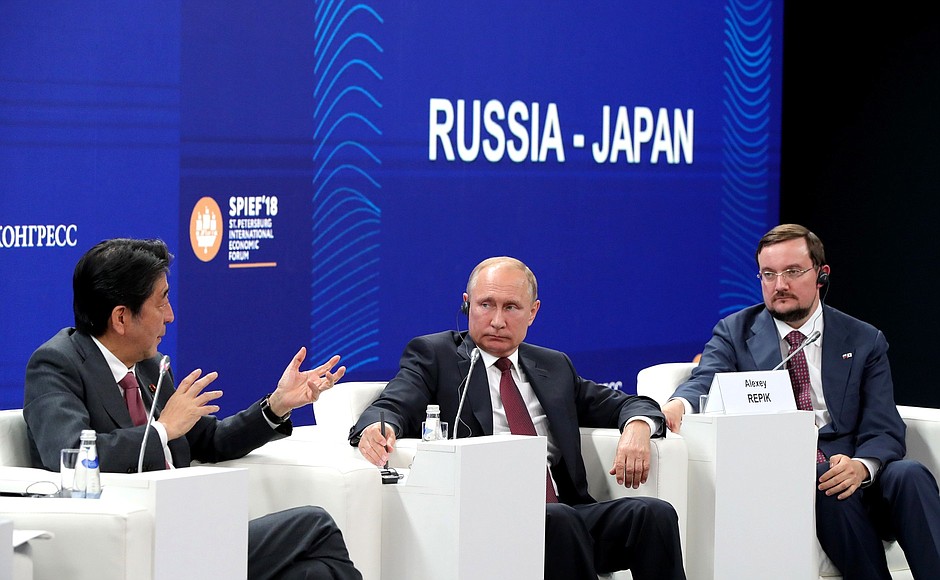Excerpts from transcript of Russia-Japan Business Dialogue panel discussion
President of Russia Vladimir Putin: I will just say a few words.
Japan is undoubtedly one of our priority partners when it comes to cooperation in the Asia-Pacific region. And not just in Asia. We would like our relations with Japan to acquire global dimension.
Actually, our Japanese friends often act exactly like that. Mr Repik has just told us about Toyota’s activity here in St Petersburg, that is, in the north-west of the Russian Federation. I know that the goods manufactured here go not only to the Russian domestic market but also to neighbouring countries.
You know that Russia is making steady progress on the path of integration in the post-Soviet space. We have set up, as many of you are no doubt aware, the Eurasian Economic Union, and it already represents a market of 170 million people, an actively developing market established on WTO principles. This means we have no boundaries to the flow of goods, investments and workforce. It is very convenient to work in such a market, including via the Russian Federation.
We took a keen interest in Japanese Prime Minister Abe’s initiatives on developing Russian-Japanese relations in eight priority fields, and have already proposed an 80-project plan on its basis. Some of these projects have already kicked off.
Japan’s achievements in high technology are world-renowned, as are those in particular industries where Japan has been and remains an absolute leader. We are naturally interested in working in those fields.
We place special emphasis on developing traditional cooperation areas, including energy.
The automobile industry has already been mentioned here. The Prime Minister pointed out, including at today’s panel discussion, the possibility of working in healthcare. There are concrete proposals here, including working together in the fight against cancer. I should stress that Russia also has something to offer to our Japanese friends and partners.
To sum up, the tenor of Russian-Japanese relations right now gives me every reason to hope that the volume of Japan’s investments – it is currently fairly modest, let us say, around two billion dollars overall – in the Russian economy, as well as the volume of trade – which is also modest so far in view of our potential, something like 18 billion dollars as of last year – all that can be increased many times over.
And we are aware of our Japanese friends’ interest in improving relations. I would like to assure you that for our part we will do everything possible to ensure favourable conditions for investing and for the economic activities currently underway.
Thank you very much.
<…>
Vladimir Putin: First, I would like to thank our colleagues for the attention to cooperation with Russia and for working in our market in general.
But I will start with the last issue. Digitalisation and digital transformation is one of our priorities and not only in the petrochemical and energy industries. In general, we want to work more actively – and we spoke about this at today’s panel discussion – in the area of artificial intelligence, and the digitalisation of the economy as a whole, including the energy industry.
There are plenty of areas here, which are primarily linked with enhancing efficiency and reducing costs. Japan has really succeeded in this respect, and not only in the hydrocarbon energy industry but also in energy transfer and consumption. There are many areas here and you know this much better than I do.
Our power companies are working on resolving these tasks and are doing a good job. The same applies to energy production and transportation and all other related processes.
You decided to cooperate with Gazpromneft and this is a good choice because it is one of the advanced, high-tech companies in this area. Probably, now I understand, maybe partly owing to you, that it is paying much attention to resolving these tasks. Quite recently, I had an opportunity to talk with the head of this company. He told me in a very general sense what this company is doing in this area.
However, there are no restrictions on work with our other large companies – both private and publicly owned, such as Gazprom, Lukoil, Transneft and private energy companies that are working in Siberia – this is where the production is mainly. There are no restrictions at all. You are welcome to work with electric power companies. This work is very important in hydropower engineering. To sum up, there are no restrictions whatsoever.
A few words about support measures. These measures are, of course, general in character. We are trying to come up with some benefits to spur the development of the digital economy. We have a whole list of them. Have a look at it, please. I think it will continue to be improved.
Regarding the pharmaceutical industry, this is a very important field. We have our programme for the pharmaceutical industry’s development but we are aware that our Japanese friends have succeeded in many areas. I draw your attention to the fact that we have increasingly more foreign partners taking part in this work, primarily from Europe. We have Swiss, Italian and German companies working here. We will definitely welcome that. But there is apparently a problem related to drug registration which may take a year and a half. There is too much red tape here.
We have advanced in many areas, and the advances were good, I mean basic issues involved in setting up a business. For example, company registration, grid connection and so on. But purely bureaucratic matters certainly require extra attention. I am not sure we can fully accept certificates for medicines issued by foreign countries, this requires thorough consideration.
We have a certification procedure of our own. However, it should become more flexible, there is no doubt about it. I ask the Healthcare Minister to address that, even though we spoke about it a number of times. I heard what our colleagues said, and will look into what is going on in this area.
We have very good experience here when our foreign partners work, and they work successfully. We met with French businessmen in this very hall today. Joint insulin production in Russia and its sale to third countries was cited as a positive example. And the number of such examples is growing.
Now, regarding work in the Far East. My colleague mentioned in his speech the capabilities of the free port of Vladivostok. We have expanded this regime of the free port of Vladivostok with its various benefits to the other ports of the Far East, but this is all part of the so-called priority development areas.
I am confident that our colleagues working there know what that is. Let me reiterate, there is a whole collection of benefits and preferences – starting with the customs and tax regime and ending with administrative procedures.
What would I like to say in this context? I know that the matter deals with expanding the term of some benefits and we can, of course, think about this. But we proceeded from the premise that it is first necessary to try and make the most of what is offered today. I understand that this is about bigger investments that take longer to recoup. We are ready to consider this as well.
However, to expand the term of benefits that we are discussing, we need to understand the kind of investment we are talking about, the size. We are ready to discuss this. The Minister of Economic Development is present here and is listening to what we are saying. We often discuss this issue between ourselves.
These seven years that seem to be the subject of our discussion are a compromise decision on our part. The Ministry of Economic Development often insists on extending this period as you are suggesting. The Finance Ministry believes we should first see how it works in practice over seven years. We are ready to discuss this.
Now the next issue linked with currency risks and settlements. I have just said this at today’s meeting with the heads of major international news agencies. I believe the obstacles that our US partners sometimes create for dollar settlements are a big mistake on their part. I think so because, as they try to address momentary political concerns, however unsuccessfully, they are undermining confidence in what is essentially the only reserve currency in the world.
All countries without exception are starting to think about how to get away from this US currency monopoly and how to ensure the normal functioning of their financial institutions. I think our American friends should ponder this. I am certain that…in fact I know, because I read American analytical materials, that many experts criticise such decisions in the US itself. However, this makes it necessary to think about how to work normally in these conditions.
There is the issue of the volatility of the yen and the ruble, but as you know, we have said it and Ms Lagarde mentioned it today, we can safely say that in recent years Russia has achieved highly stable macroeconomic indicators. We have brought inflation down to an all-time low. Last year it was 2.5 percent, and this year, as our government economists say, it will be three percent or slightly higher. The Central Bank says it will be 2.8 percent.
Do you know why this is happening? The reason is that the government members in charge of the economy want to spend more money and proceed from the premise that inflation will edge upward, while the financial authorities whose task it is to hold inflation at bay, say no, if we are careful, we may keep inflation at 2.8 percent. Meanwhile the gold and currency reserves are growing, the external government debt is less than 20 percent, the trade surplus last year was $130 billion and unemployment stood at 5.1 percent.
Besides, we have robust growth of investment in fixed assets. While the GDP increased by 1.5 percent, investment in fixed assets amounted to 4.4 percent last year. We all know what this means. It provides the foundation for growth in the coming 12 to 12 to 18 months because last year investments in fixed assets grew 2.5 or actually 3 times faster than GDP last year.
Thus, basically, the trends are very positive. The ruble is essentially a fully convertible currency. Let us settle in rubles. We are all for it. We can work out a mechanism of free conversion into the yen, the euro and the dollar. This can be thought out in detail, it simply needs an effort.
I believe that together with the central banks, together with the financial authorities on both sides we will certainly solve this problem and will work effectively. I would like to thank you all for the joint work. And I would like to say something else.
Yes, problems exist, but still our trade with Japan amounts to $18 billion, with China it is $86 billion and with Germany it is around $50 billion. Obviously, our trade with Japan does not match our potential at all.
Yet all our other partners are working in the same conditions, so with them, the situation is different, and we move forward faster and achieve greater volumes. We can certainly do the same with Japan, all the more so because our economies, due to their structures, can well complement each other.
We are aware of the keen interest our Japanese friends are showing in cooperation in the field of energy, and how Japan feels about buying our gas, oil and petroleum products. All this can be done. We can develop nuclear power together. We discussed it with the Prime Minister, and we can discuss power transmission lines and cable lines – there are many options – and transport infrastructure. In short, if there is good will, and I see that there is good will on both sides, success is inevitable.
Thank you very much.
<…>
